
Hollywood doesn't know what to do with movies like The Current War and Motherless Brooklyn. They're awards contenders that aren't actually going to win any awards, and they are movie star-driven in an age where movie stars don't matter. (Benedict Cumberbatch, Michael Shannon, Tom Holland, and Nichols Hoult are all superhero movie-tested, yet their combined effort has yet to pack in the crowds for Current War.) In a different era, these films would have been middling, but respectable box office performers destined for a second life on video and cable; today, they are box office ankle-biters destined to be watched by more people on airplanes than in movie theaters.
It's not hard to look at this as exactly the kind of thing Martin Scorsese was talking about when he recently argued in his already-infamous New York Times op-ed, "In many places around this country and around the world, franchise films are now your primary choice if you want to see something on the big screen. It's a perilous time in film exhibition, and there are fewer independent theaters than ever. The equation has flipped and streaming has become the primary delivery system. Still, I don't know a single filmmaker who doesn't want to design films for the big screen, to be projected before audiences in theaters."
He went on to acknowledge that he wrote all of that as the man who just made a movie with Netflix because that was the only place in town willing to bankroll something like The Irishman.
The solution? More people need to support smaller films, but I see this as an ultimately losing battle to convenience and peak TV. The hollowing out of the local cineplex continues ever unabated, but cinema itself lives on in different formats the Lumiere Brothers never could have imagined. The Current War and Motherless Brooklyn are in theaters today; tomorrow, they will each be on some streaming service. Next week, they'll skip the theaters entirely.
Do they deserve better? Maybe. Maybe not. The Current War's marketing team has done a very poor job of explaining why its official title is The Current War: Director's Cut. It's hard to sell Motherless Brooklyn as an adaptation of a beloved book when Edward Norton changed just about everything from the source material other than the lead character (an amateur detective named Lionel Essrog suffering from Tourette's syndrome) and the story's inciting incident (his mentor, played here by Bruce Willis, is murdered). However, both films delve into the social history of America and emerge as entirely watchable stories about ambition, greed, and how easily you can lose your soul to the fight for progress.
The Current War
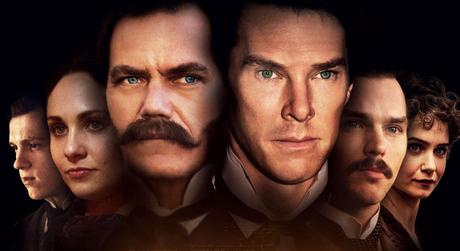
Scorsese - while not despairing over the state of Hollywood or mapping out his grand opus The Irishman - saved The Current War. The Weinstein Co. steamrolled over director Alfonso Gomez-Rejon's original vision. The version of the movie which premiered at the Toronto International Film Festival in 2017 was then met with terrible reviews. The subsequent implosion of all things Weinstein left in total limbo.
Cue entrance, Uncle Marty, one of Gomez-Rejon's mentors.
"[Scorsese] agreed to be [a producer] just as a safety net. God forbid that the worst would happen, he'd be there as a safety net, and if the final cut wouldn't go to me, then he would have the final say," Gomez-Rejon recently explained. "And then the worst happened. Literally, the absolutely worst happened, and he was there to save the day, and he got the final cut. And anyone who wasn't Marty might have gone and recut the movie; [but] what he did was hand the movie to me and let me make the movie I intended to make."
That's why The Current War is now officially known as The Current War: Director's Cut. Gomez-Rejon cut 10 minutes from the runtime, added five new scenes, reworked the narrative structure, and ordered an entirely new musical score. The result, according to those who've seen both versions, is something far superior to what disappointed everyone in Toronto.
I've only seen The Director's Cut and found it initially offputting. The story is, at its core, a history lesson about Thomas Edison (Cumberbatch) and George Westinghouse's (Shannon) battle for supremacy at the dawn of electricity. Gomez-Rejon comes off as hypersensitive to the possibility that some will find this boring. As such, the opening scenes of the movie are edited and shot in an overly kinetic fashion - cuts abruptly arrive with little to no reason, the camera similarly looks up at people from below or slightly askew in a sometimes overly showy way.
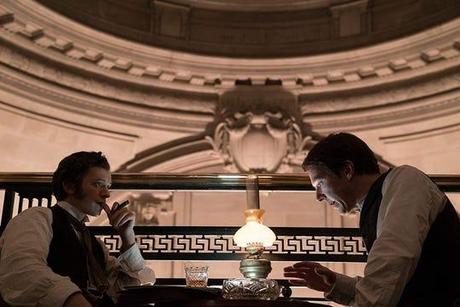
Is Gomez-Rejon overcompensating to give this story the type of electricity Edison and Westinghouse are playing with on-screen? Or are these the signs of a troubled production, a director making due with what footage he got since he can't very well go back and refilm everything?
Probably a little column a, column b there. Once the film settles into a more natural rhythm, it turns into an engrossing story capable of moments of great spectacle.

Benedict Cumberbatch doesn't exactly break new ground as Edison, but it is a bit of a gas watching him do his Doctor Strange thing - entitled, arrogant genius overdue for a humbling - in the body of an actual historical figure. Tom Holland, as Edison's assistant, charms as usual. Shannon plays Westinghouse as a principled man pushed to his limit by Edison's brazenness, and Hoult capably plays Nikola Tesla as one of American history's brightest minds who also just happened to be very, very bad with money and contracts.
Gomez-Rejon deploys one impressive trick after another to keep it all visually stimulating and easy to follow. Important figures, for example, are identified on-screen by text boxes. Recreated kinetoscope reels - a later Edison invention - occasionally act as scene transitions. Issues of celebrity, ethics, and work-life balance (that's easy, they worked nonstop and had no lives) are addressed. As the story barrels toward its big climax - who will get the contract to power the Chicago World Fair, Edison or Westinghouse? - you find yourself genuinely dying to know how it ends even if you can already guess based on what you know of history.
If just one Avengers fan is drawn in by the promise of Doctor Strange and Spider-Man together again and ends up learning a bit about history, then it will have all been worth it.
Try telling that to the financiers.
Motherless Brooklyn
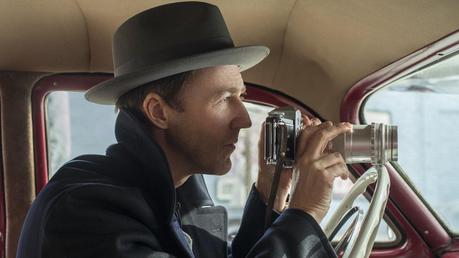
If The Current War's path toward the screen was a sprint to avoid constantly moving parts and somehow still find the finish line, Motherless Brooklyn's journey was more like a long-distance marathon. Originally published by Jonathan Lethem in 1999, Motherless Brooklyn is the thing Norton thought about right before making Fight Club, and it's the script he finally finished around the time of starring in Moonrise Kingdom and The Bourne Legacy. For those who haven't memorized their Norton filmography - and, really, why would you do that? - that means he's been mulling this over for 20 years and actively trying to get it made for at least seven.
With Lethem's blessing, he took a contemporary story about a differently able detective and turned it into a Chinatown-esque 1950s film noir. The story's murder mystery peels back layer after layer until Norton's character, Lionel, finds himself face to face with the architect of the city's corrupt infrastructure policies. The fact that this man is based in part on the historical figure Robert Moses doesn't completely get you past the obvious Trump of it all. (It certainly doesn't help that Alec Baldwin is playing him and seems to have carried over a couple of his SNL Trump tics.)
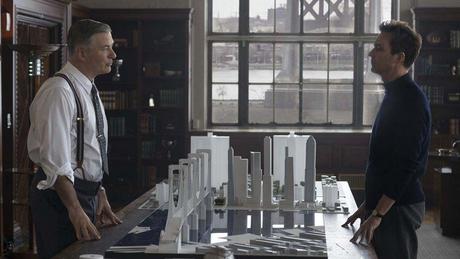
"The dark, the shadow narrative of how modern New York really got built - the racism that was sort of baked into the city," Norton has said in just about every interview.
Regardless of whether it was Donald Trump, his dad Fred, Robert Moses, or the slumlords before them, modern NYC was built by men with malice in their hearts, the film clearly argues. In such times, you have to take a side, and what begins as a revenge story turns into a moral litmus test for Lionel. He's a character who thinks of himself as loyal only to his mentor and friends (Bobby Cannavale leads the few gumshoes also in Willis' employ), all of them coming from rough and tumble backgrounds, but through this case, Lionel comes to realize there are larger stakes to be considered. You can't stay on the sidelines of history forever.
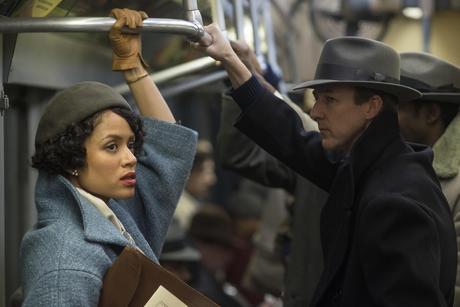
There are two big problems about this story, and they both come back to Ed Norton. First, his version of Tourette's occasionally enters into cringe territory. Second, he's a white man directing and writing a movie in which he cast himself as the white lead who tries to help a bunch of black and brown-skinned people who are being displaced by the city's racist politicians.
That last part runs awfully close to a white savior narrative. Lionel's suspect-turned-love-interest Laura (Gugu Mbatha-Raw), a community organizer, is stuck being the dark-skinned person telling the white person what racism feels and looks like.
Not surprisingly, this is an argument Norton has pushed back on. In his view, Lionel is the perfect protagonist to empathize with what Laura is experiencing because he lives in an era where there isn't even a name for Tourette's yet. (Others call him "spastic.") There's just something wrong with his brain. He has a photographic memory because of it but also isn't entirely welcome in any room he walks into. He doesn't seek to save or help anyone; the natural course of things forces that onto him, and as an outcast himself he's drawn to Laura and finds inspiration in her utter sincerity and quest to do the right thing.
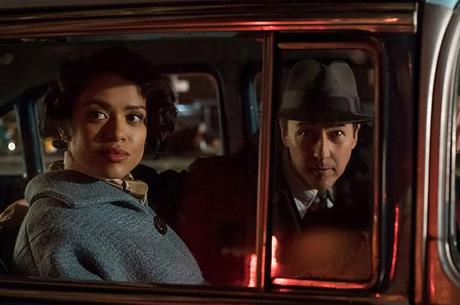
If you can go along with that, Motherless Brooklyn is an ultimately entertaining yarn. It walks in the footsteps of cinematic giants, not just the great film noirs of the black and white era but also the likes of Chinatown and L.A. Confidential. It's nowhere near as good as those. The first hour, in particular, is a bit leaden, a bit too heavy on the jazz score and Lionel's voiceovers. The second hour is when the film really grabs you. It's when the puzzle pieces are all finally on the board - Willem Defoe appears as a character who is a real wild card, for example - but you'll be damned if you know how they all connect.
This is where Norton's performance and direction really shine. Yes, he may be still leans a little heavily on jazz and repeatedly hitting us with little snippets from Thom Yorke's new original song written for the movie, but he also displays a real knack for filming chase scenes, particularly one which begins in a hallway and ends on a roof.
That makes Motherless Brooklyn a "you'll know if it's right for you" kind of movie. Dig Thom Yorke? Film noir? Murder mysteries? Seemingly straightforward narratives that trojan horse a history lesson with modern-day implications? Cool. You'll probably enjoy this movie, but if you can't get past the idea of Ed Norton playing someone with Tourette's it'll be a long two and a half hours.
Are you waiting out these films until they hit streaming? Or have you actually seen them? Between the two, I prefer Current War but Motherless Brooklyn has its moments. Is there no scenario in which you'll ever care to see Ed Norton doing his best film noir impression? Let me know in the comments.
